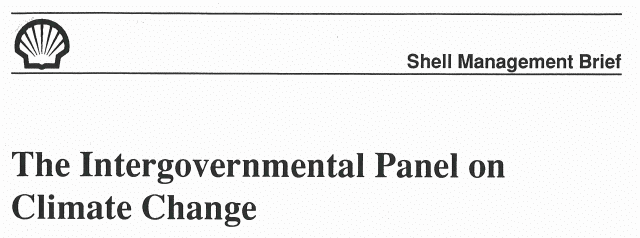This is a 1996 primer for Shell International executives on the history and current status of the Intergovernmental Panel on Climate Change’s (“IPCC”) scientific process and conclusions. It also summarizes the workings of the IPCC’s political adjunct, the Framework Convention on Climate Change (“FCCC”). This document is a part of a larger collection discovered by Jelmer Mommers of De Correspondent in a trove of internal Shell documents.
An executive summary bullet-points the key takeaways from the soon-to-be-published IPCC Second Assessment Report (“SAR”), which explain that climate change is a significant hazard to human society and the natural world, technologies can mitigate its risks, and governments have a range of choices about how to address it. The author calls the SAR an implicit call to political action. The brief suggests this is inappropriate given what is characterized as the uncertain grasp of climate science on how to model the climate system and predict outcomes.
The document begins by admitting that climate change may be the most grave and potentially catastrophic environmental issue the world has ever faced. It reiterates warnings in other Shell documents about CO2’s persistence in the atmosphere, meaning that delays in mitigation will greatly increase the harm done. The problem defies solution because economic development is “inextricably” linked to greenhouse gases. And since, the author claims, scientists aren’t even certain that global warming is occurring or what shape it will take, decisive action is ill-advised since there can be no confidence about solutions.
In a short tour of the IPCC and FCCC frameworks set up by the world’s nations to tackle the problem, the document narrates the history beginning with the 1992 Rio Summit, notes the slow uptick in scientific consensus on climate change in the four IPCC assessments (including the SAR, then available in draft form), and describes the scientific body’s three Working Groups: science, impacts and adaptation/mitigation, and economics.
The brief attacks the headline finding of the IPCC, echoed in a 1995 Time magazine article, that human activity has produced a “discernible impact” on climate as an oversimplification given uncertainties about the extent of natural variability. Nevertheless, it notes, without qualification, that even restricting GHG emissions to 1990 levels would still allow CO2 levels to rise to 500 ppm by 2100.
The IPCC Working Group on impact, adaptation and mitigation is criticized for failing to note the supposed potential benefits of more CO2, and the author says claimed increases in severe weather are not borne out by the history of weather patterns, while the economic Working Group fails to provide sufficient reasons for taking aggressive mitigation actions likely to cause economic harm.
Along the way, the document praises the IPCC, acknowledging that these are the world’s leading experts in climate science, calling the 50-author, 1,000-page SAR “a truly heroic product,” and most significantly, noting that the IPCC has been successful in pulling together global science in a crash program to study and understand global warming – a success notably lacking in the FCCC’s efforts on the political end.
While doubt is raised about the certainty of the science, nowhere in the scientific summary is there mention of credible scientific evidence discounting climate change.
1996 Shell Management Brief “The Intergovernmental Panel on Climate Change” (Text)
Interested in more Shell documents? Full index here.


